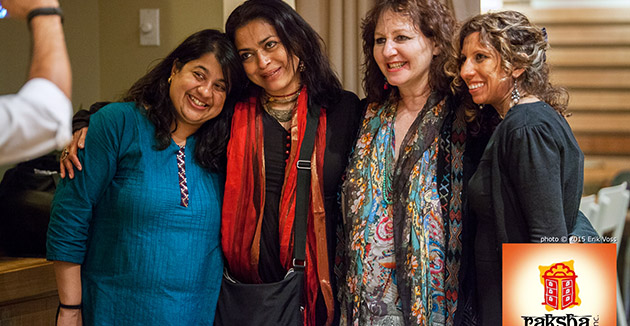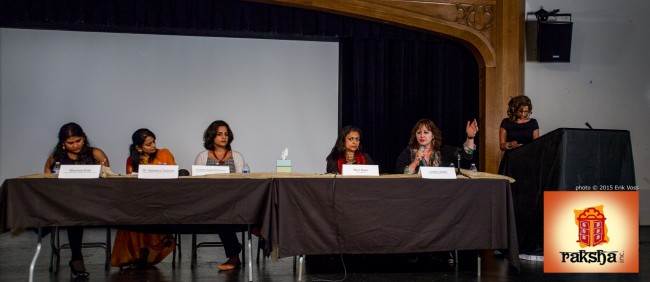BY VEENA RAO
Atlanta, GA: Atlantans had the opportunity to watch ‘India’s Daughter’ and interact with its director, Leslee Udwin, at the Atlanta premiere of the controversial documentary at Oglethorpe University on April 25. The event was hosted by Raksha, Vibha and journalist Neha Negandhi.
‘India’s Daughter’, which aired on BBC on March 8, is based on the 2012 Delhi gang rape and murder of 23-year-old Jyothi Singh. The film gained widespread publicity after it was banned in India.
Read: “I will always fight for justice” – Our exclusive interview with Leslee Udwin
The screening was followed by a panel discussion with Udwin, Moni Basu of CNN, Dr. Nazeera Dawood, Health Promotion Division Director at Fulton County’s Department of Health and Awareness, Guneeta Singh McElhenny of Raksha, and Mounica Kota, Student, Oglethorpe University and president, Coexist organization.
The discussion centered around the topic, ‘From Dialogue to Action’, and threw up some interesting insights and perspectives from the panelists and audience members.
Udwin said she had set out to make the documentary moved by the extraordinary protesters who thronged the streets of Delhi in massive numbers. “I thought I was making a film on rape. But what I came to realize, primarily through my access to the rapists, was that rape is simply a symptom of a disease- and that disease is gender inequality,” she said. “This disease has other symptoms too- trafficking, genital mutilation, acid attacks, sex selection. I came to realize that not only did the rapists think of women (as being) of less value than men, but society itself thinks so.”
The film maker was quick to add that this mind-set is a global one. “In this country (the US), the greatest democracy in the world, democracy is not for women. 97% of rapists have not spent a single day in prison. One in four women on college campuses is raped violently. It is simply not acceptable that we women should be at the bottom of the heap. It cannot and must not go on. There is only one way to tackle this for future generations- that is education in human rights,” she said.
Moni Basu, who was a victim of date rape while in college, said abuse is often more insidious. “The media covers extreme stories. I get sent to cover those, but it is often these little things that are happening,” she said.
Basu talked about growing up in a large well-educated middle class home with grandparents, uncles, aunts and cousins. “My uncles and my grandfather didn’t beat their wives, but everyday there would be something that happened that taught the boys that they were superior to the girls. I, growing up as a girl, believed that. For example, the women would cook all day long but it was the men who got to eat first, then the boys, the little girls and last of all the women.”
“Education starts at home. In India, change has to happen in every home. You can’t grow up with that mindset and suddenly you are 18 and you are supposed to know better. It doesn’t work that way,” she added.
Nazeera Dawood said getting into medical school was a huge personal win for her, as no female family member had gone to college before. She said she had to lie on her stomach on the floor for a whole week in protest before her family relented and allowed her to go to college.
“Sexual violence is a huge public health problem. One in five women in the US gets raped in their lifetime, and one in 59 men get raped,” she said, adding that the solution was in being proactive. “Teach children self-defense- teach boys and girls how to stay away from predators; teach boys to respect women, and women to respect men. Be comfortable talking about these issues,” she said.
The discussion included some interesting inputs from audience members- from accounts of almost being gang-raped at sporting events to gender inequality through history and in the scriptures. An audience member described her friends as “feeling beautiful” after female circumcision, to which Udwin reacted angrily: “I must beg you not to be politically correct. It is this political correctness that stops the UN from doing its job. The impulse not to offend people stops us from taking actions that we should be taking in this world.”
Journalist Neha Negandhi moderated the discussion. Aparna Bhattacharyya, executive director of Raksha emceed the event.
Proceeds from the event benefited Raksha and Vibha.






1 comment
[…] https://www.nripulse.com/%E2%80%98india%E2%80%99s-daughter%E2%80%99-premieres-in-atlanta/ […]